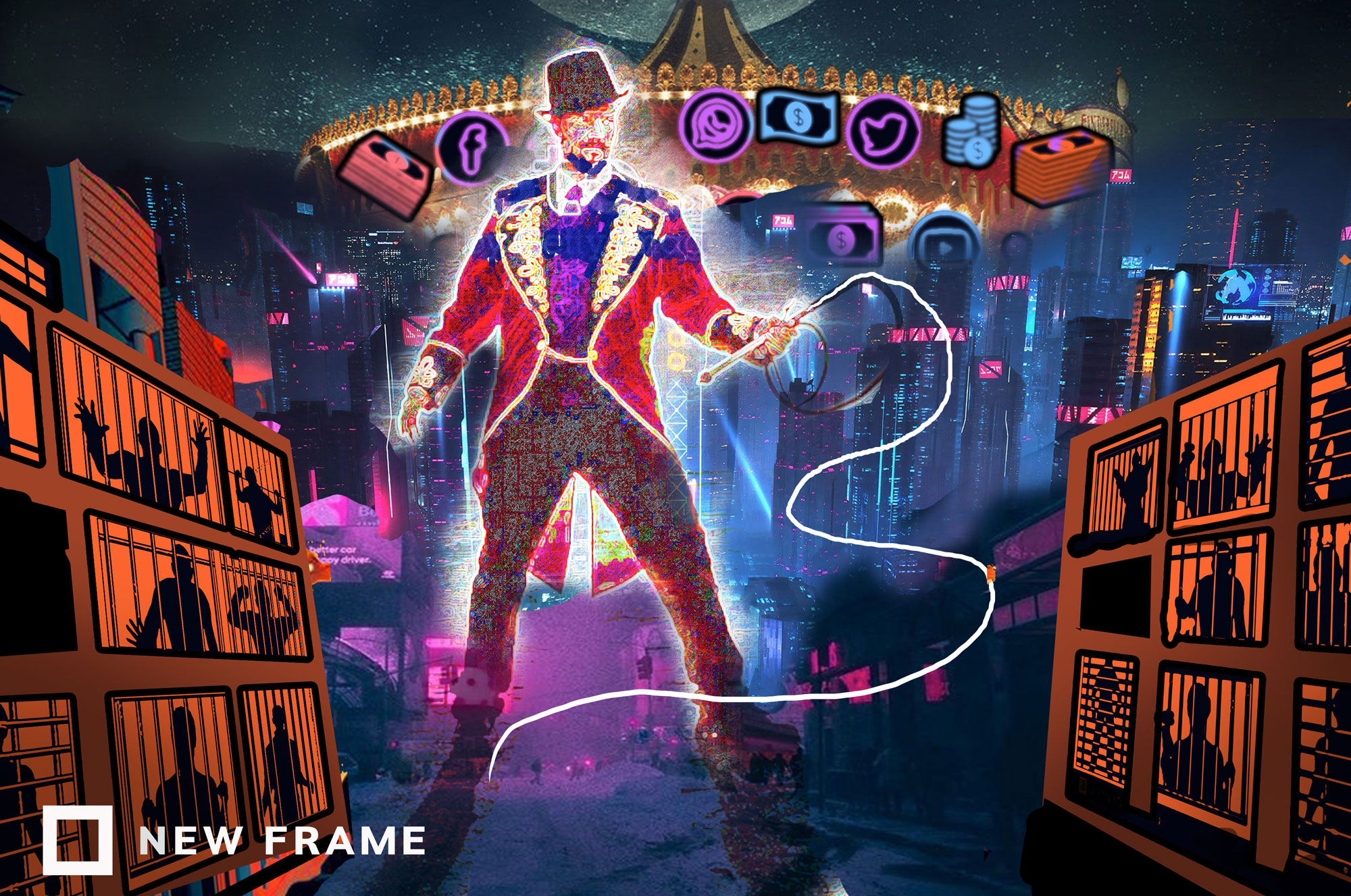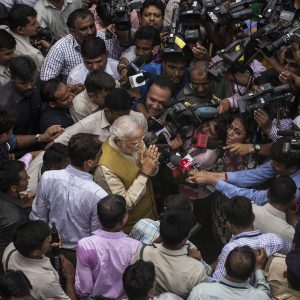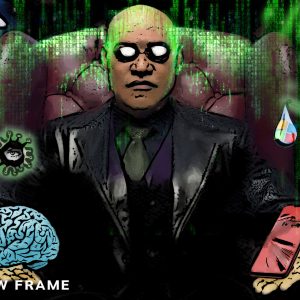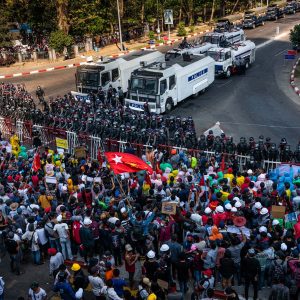The pseudo-realities of power
It is imperative to discern between reality and the spurious yet compelling versions of it offered by ruling classes completely uninterested in creating a free and just society.
Author:
2 March 2021

Across the world, autocratic and kleptocratic ruling classes turn to disinformation and propaganda when their power is questioned and challenged.
India is seeing farmer-led protests that have brought masses of citizens out to the streets. A 24-hour strike in November is believed to have involved up to 250 million people. These protests were sparked by pro-corporate agricultural and labour reforms that will further impoverish millions while benefitting politically connected elites. The reforms are the work of the ruling Bharatiya Janata Party (BJP) and its leader, Prime Minister Narendra Modi.
This Hindu-nationalist party combines neoliberal plunder with right-wing extremism. Modi has intensified the persecution of Indian Muslims and aggressively clamped down on independent journalism and political protest, often using repressive laws that were first written by British colonial authorities. And this state-led repression is normalised and encouraged by a septic constellation of YouTube and social media accounts, which offer even more violent variations on BJP ideology.
As Modi and his party are confronted by some of the largest mass protests in history, they have retreated into paranoia and denying reality. Multiple journalists have been arrested on charges of sedition, and the Delhi office of the progressive media portal NewsClick was raided by the police and its staff detained for 113 hours.
Related article:
The BJP claims that the protests are being funded by shadowy, anti-Hindu forces and has accused the disparate likes of Greta Thunberg, George Soros and Rihanna as being involved in this conspiracy. One YouTube video said that journalists and activists should be hanged for “conspiring against India”.
This combination of rampant conspiracy paranoia and calls for mass violence echoes QAnon and other beliefs associated with Donald Trump. His most fervent supporters believe him to be a messianic figure who is secretly working to bring down a cabal of “deep state” paedophiles. These completely fabricated depictions encouraged the storming of the United States Capitol in January, but they also served a broader purpose.
Related article:
The romanticised picture of Trump as a common man fighting against elitists is clearly fraudulent, as his policies overwhelmingly favoured the super-rich. However, this framing helps to build popular legitimacy among working- and middle-class voters, despite it going against their material and social interests.
In South Africa, former president Jacob Zuma’s supporters claim that he is being targeted by an imperialist conspiracy and foreign spies. In practice, however, the so-called radical economic transformation forces use radical slogans to disguise a political agenda that is focused on upholding kleptocracy. Its primary goal is protecting politicians like Zuma, Ace Magashule and Julius Malema from the serious legal charges of corruption and graft that they are all currently facing.
Political marketing
Over the past decade, a particular strain of political marketing has become dangerously prominent. Leaders of political parties – often with highly compromised backgrounds – use social media to advance inauthentic populist images. They encourage their supporters to live in alternate realities in which all critical media reporting or protest is portrayed as a conspiratorial attack by shadowy elitists. But, once in power, they proceed to freely enrich themselves, often at the expense of their own voter base.
Such a paranoid political style is not a recent invention, but the rapid proliferation of social media and the internet gives it a new prominence and influence. The rise of algorithmic manipulation and other new forms of digital capitalism has encouraged a generalised suspicion about the media, academia and other sources of knowledge production. The sense that reality and fiction are increasingly blurred is a pervasive sentiment these days.
The media have often reported this using such neologisms as “fake news” and the “post-truth” society. But while weaponised disinformation is clearly on the rise, the media also reflect their own biases when reporting on propaganda campaigns.
Related article:
Liberals often reduce the question of propaganda to a mere question of information. They believe that people, if presented with the correct facts by the proper technocratic experts, will be pulled away from conspiracies and extremist viewpoints. The implication is that political paranoia is a product of a lack of education and cognitive failings on the part of the “lower” classes.
However, this unquestioned elitist bias obscures how these same alternate realities are both supported and deployed for the benefit of members of the ruling class. And it downplays the material and ideological factors that attract and lure people into “pseudo-realities”.
Sophisticated manufacturing
The term “pseudo-reality” was popularised by the American science fiction author Philip K Dick. In a 1978 speech he said: “Today we live in a society in which spurious realities are manufactured by the media, by governments, by big corporations, by religious groups, political groups… So I ask in my writing, what is real? Because unceasingly we are bombarded with pseudo-realities manufactured by very sophisticated people using very sophisticated electronic mechanisms.”
Dick’s own fictional writing, such as the 1968 novel Do Androids Dream of Electric Sheep?, which was adapted into the film Blade Runner, anticipated our own time. He dealt with issues such as the rise of the surveillance state, hyper-consumerism and growing social inequality.
But Dick was also responding to the pseudo-realities of America in the 1950s and 1960s. He saw how the rise of mass advertising and post-war consumer culture led to existential alienation and personal instability.
And, as someone with leftist politics views, he also witnessed how the US state embraced extreme McCarthyism to claim that all progressive politics were the product of a shadowy Moscow plot. Such ruling-class paranoia would be used to repress and terrorise the civil rights and anti-Vietnam War movements.
For Dick, what separates a pseudo-reality from the actual material reality is that “reality is that which, when you stop believing it, doesn’t go away”. For example, the reality is that humanity is facing the existential crisis of climate and ecological collapse, a reality validated by mountains of empirical data and observation. By contrast, the fossil fuel industry has sponsored a pseudo-reality of climate denialists and lobbyists who fatally encourage society to ignore imminent threats to its very survival.
Seeking legitimacy
Historically, ruling classes have used violence and force to retain power. But this coercion is also sustained through building “spurious realities” that create popular legitimacy for their rule. The forms of these are always changing because of political, cultural and technological shifts.
For millennia, most societies were ruled by religious ideologies around hereditary and divine right in which feudal and tribal kingship was depicted as an eternal reality. As the feudal order collapsed, new forms of republican and democratic politics emerged. Some of these only wanted freedom for men and colonial property owners. But more radical, grassroots movements agitated for social emancipation for the poor, women and the subjugated populations of the colonised world.
Related article:
In response, European states began to adopt an ideology of nationalism, whereby they claimed to rule on behalf of the people – even if actual political rights were still denied to a majority of their subjects. This nationalism was also used to legitimise the violence and greed of European colonialism by packaging it as a civilising mission.
The British empire, for example, was sustained by sepia-toned, Rudyard Kipling-style kitsch about the “white man’s burden” and the British “spirit of fair play”. This ideology was intended to not only build support for the empire among British people, but also among the classes of local administrators and collaborators in its Asian and African colonies.
In reality, however, the empire was a blood- and laudanum-soaked enterprise that plundered the South while sustaining an archaic class system in Britain itself. Imperial delusions would later convince millions of young men to sign up to die in the pointless bloodbath of World War I. A century later, it would inform the xenophobic paranoia that led to Brexit.
Media manipulation
The 20th century saw a new media landscape of mass advertising, newsreels and radio, later to be joined by television. Simultaneously, socialist, anti-colonial and feminist politics offered a radical challenge to established power structures.
One of the political responses to this was the totalitarian models of fascists like Adolph Hitler and Benito Mussolini, who enforced complete state control over the media and popular culture. Despite their reactionary political agendas, they were pioneers of using new technology to advance brutal fantasies of blood, soil and national revenge.
From a contemporary standpoint, black and white newsreel footage of Hitler ranting and raving to a rapt audience may seem archaic. But at the time, millions of people saw him as representing the future.
As the British writer JG Ballard observed, fascists anticipated many forms of media manipulation that are commonplace these days: “Certainly, Nazi society seems strangely prophetic of our own – the same maximising of violence and sensation, the same alphabets of unreason and the fictionalising of experience. Joseph Goebbels in his diaries remarks that he and the Nazi leaders had merely done in the realm of reality what Fyodor Dostoevsky had done in fiction.”
Interestingly, both Goebbels and Mussolini had written novels in the days before they were able to get to grips with their real subject matter. One wonders if they would have bothered now, with the fiction waiting to be manipulated all around them.
Resisting spin
In stark contrast to the fascist states, liberal democracies present themselves as free societies defined by the open flow of facts and information. In practice, however, much of this information is itself packaged and manipulated by governments and big business.
This is often defined as “public relations” or “spin”, but could just as credibly be called propaganda. Edward Bernays, who is often called the father of modern public relations, developed many of his theories while working on psychological warfare for the US government during World War I. Later, he would instruct business on how to market to people’s most intimate wants and desires.
These techniques are still used to disguise or legitimise autocratic political rule, economic exploitation and environmental destruction. These pseudo-realities range from the greenwashing used by corporates to minimise their role in pollution to the rebranding of imperialist wars as “humanitarian interventions”.
Related article:
Spin in capitalist society also works to narrow the political debates and make it appear as if there is no credible alternative to neoliberalism, austerity and autocratic state power. This is used to paint anti-systemic ideas as “unrealistic” and frame our world of markets and billionaires as eternal and immutable. But as the great utopian thinker Ursula K Le Guin noted: “We live in capitalism. Its power seems inescapable. So did the divine right of kings. Any human power can be resisted and changed by human beings.”
The pseudo-realities of power aim to pacify and contain human agency and collective struggle. It is imperative to expose the fake information and manipulated narratives that create these fantasies.
But it is also vital that democratic and progressive politics offer an alternative vision of an emancipated, humanist society in which social energy and resources are deployed to deal with the real problems of the present, such as environmental collapse and inequality.
Pseudo-realities offer compelling stories about the world. But, in practice, they disempower their believers and push them even further into nihilism and rage. The counter to this is a politics that is based on facts and reliable evidence and that also empowers people to change social reality to be both more free and more just.





